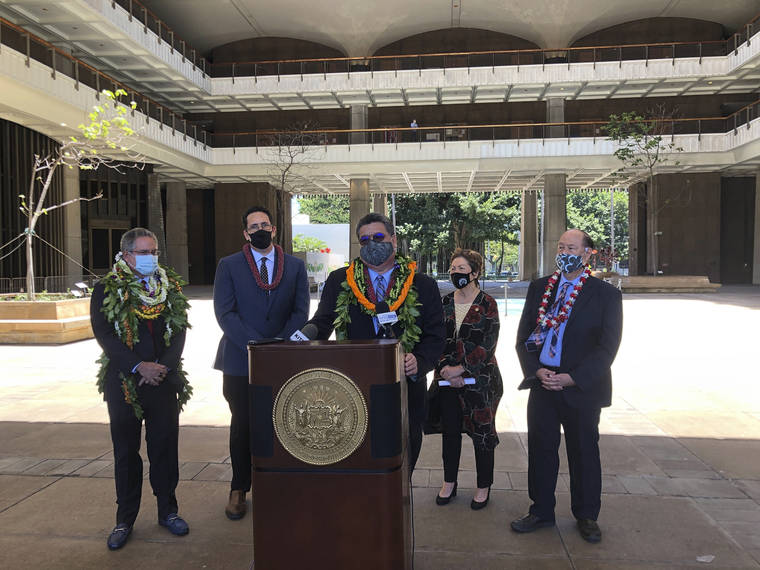At the outset of the 2021 Legislature, elected leaders at the state Capitol were staring into the abyss. The coronavirus pandemic had shuttered most of the tourism industry for the better part of a year, depleting the state’s general excise tax, which funds much of state government.
With no clear sense of whether or not Congress would come through with financial aid for states, lawmakers contemplated ways to scale down spending to address what Gov. David Ige projected to be $1.4 billion shortfalls in each of the next four years.
The pandemic relief aid did come, fortunately, suspending the imperative for layoffs or furloughs among state employees.
Unfortunately, it staved off the need to make significant gains in a campaign lawmakers themselves vowed to undertake from the start: remaking government to be more efficient in anticipation of tough times ahead.
Some of the proposed consolidation work proved difficult to push through this session, legislative leaders acknowledged as the state House and Senate adjourned for the year on Thursday.
At least one effort to shrink government bore fruit but, unfortunately, that effort was misplaced. It was trained on the agency most central to the recovery of the state’s bedrock visitor industry, the Hawaii Tourism Authority (HTA), which already has enough on its plate during this year of rebuilding without being undermined by lawmakers who want it on a tighter rein.
All of this means that there will be many deferred pledges that will come up again in 2022 — not least among these being the promise to raise the state’s minimum wage, as well as the ongoing uncertainty around Hawaii’s economic health and the state budget.
There will be no counting on federal help, at least nothing on the scale of this year’s American Rescue Plan, to fill in remaining budgetary holes. It’ll also be an election year, which is never an opportune time for changes or cuts requiring such a heavy political lift.
Leadership from the House Democratic majority said on Thursday that efforts to flatten a bit of the state bureaucracy met with pushback from the Ige administration.
Just to cite one example, said state Rep. Sylvia Luke, House finance chairwoman, even a proposal to close down the state Office of Aerospace, a little-known agency still lacking a director, stalled as the session wound down.
But more significantly, the governor has signaled his concern over the passage of House Bill 862. In combination with HB 200, the measure upheaves the operation of the tourism authority. If enacted, HTA would lose about a quarter of its budget as well as the dedicated funding source through the transient accommodations tax.
Instead, HTA would have to seek its budgetary allowance routinely from lawmakers, making it difficult for the authority to do the multiyear planning required for effective tourism marketing.
Further, the counties would lose their shares of the TAT. Although they would now be empowered to assess their own hotel-room tax of up to 3 percentage points to make up the difference, it’s unclear what effect that could have on the hotel occupancy rates statewide, which have taken an unprecedented hit.
On Thursday the HTA board met to discuss the proposed cuts. John De Fries, the authority’s president and CEO, said the governor messaged the board during that meeting, airing his “deep concern” about HB 862.
Good. The notion of remaking HTA at this critical moment is unsettling, and Ige’s uneasiness with approving the bill is well founded. Tourism is at a particularly sensitive juncture, with kamaaina worried about containing it at more sustainable levels.
Further, the future of the sector, complicated by a global health crisis, is murky at best. Lawmakers contend that the TAT restructuring will compel tourists to pay a larger share of the costs for managing natural resources. There is also the passage of HB 1276, enabling “dynamic pricing” at state parks that represents a good start.
But where the overarching supervision and planning of tourism is concerned, the Legislature’s effort to exert control, whatever the intent, would surely layer more uncertainty onto an already uncertain landscape.
Lawmakers are taking some pride in the hard work of stabilizing the state’s finances at a difficult time. They cited sundry regulatory fixes, such as crackdowns on predatory payday lending, that are fine to go in the plus column for the session.
Early in the session, lawmakers prudently acted to limit the impact of the debilitating jobless rates on Hawaii’s employers, who now will not have to bear the brunt of punishing increases in unemployment insurance taxes.
It was also admittedly a difficult time to deliver the long-promised boost in the minimum wage, given the struggles of small businesses over the past year.
But surely, Hawaii’s workforce is right to expect attention to turn now to their needs. In 2022, whatever the economic difficulties still in effect, that bill will be coming due on the Legislature’s doorstep — as will a host of others put off this year.

